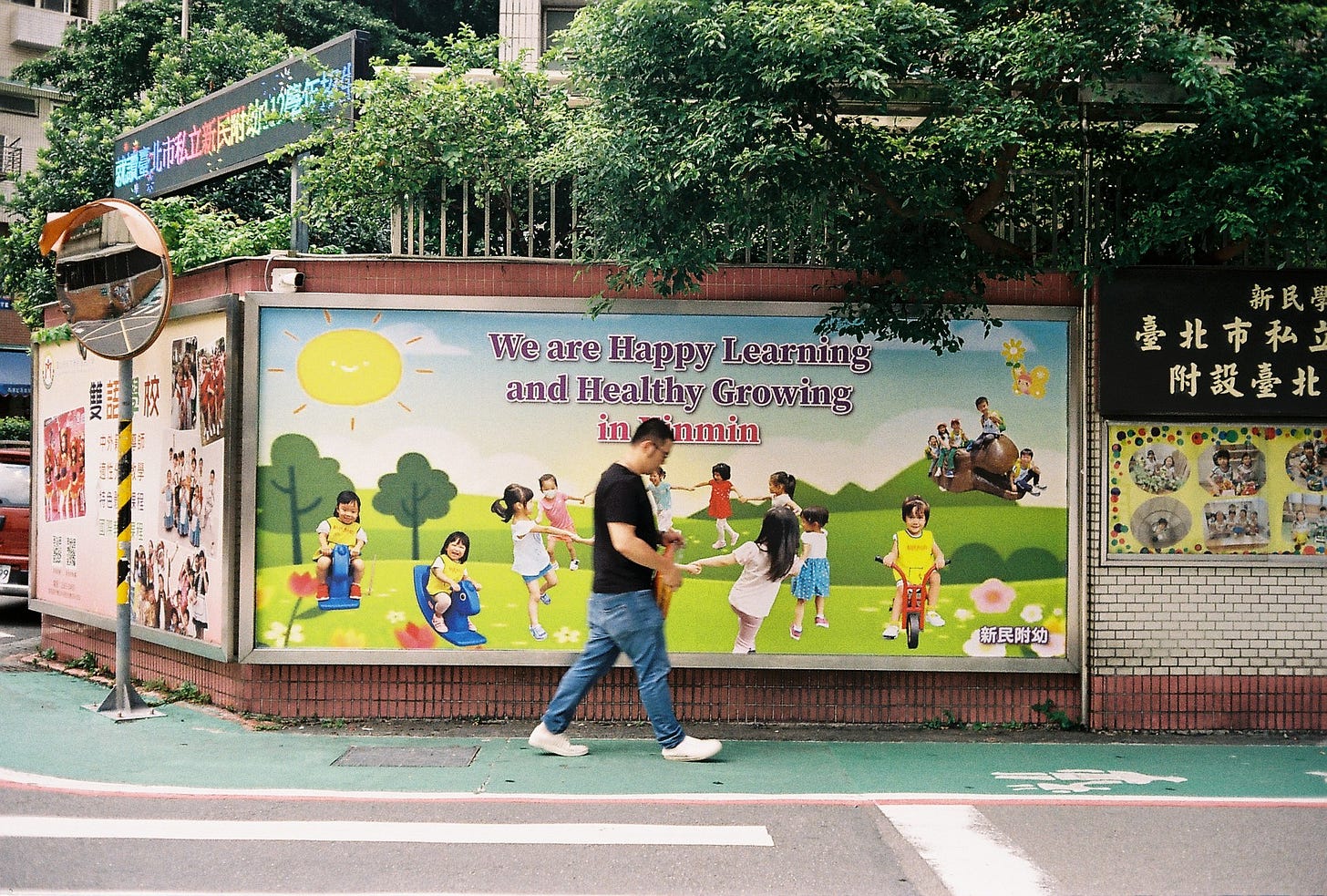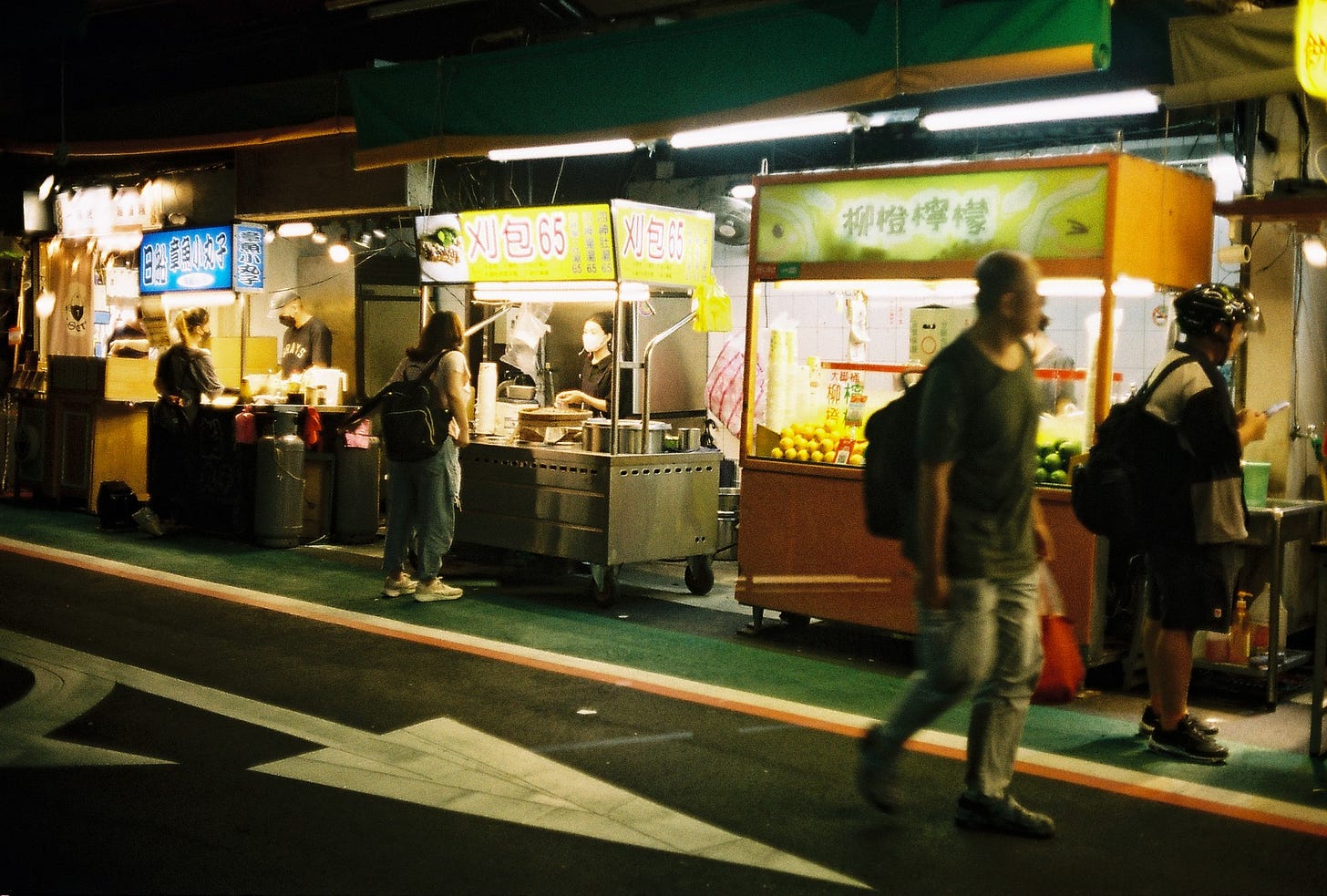apologies for the delay this week! i have suffered a tragic (read: embarrassing) accident involving a slippery (read: too difficult for me) indoor rock climbing wall, and i now have a sprained ankle (read: i can’t walk on my left foot). if anyone reading this is a doctor and can diagnose me via facetime please call me immediately thx
anyways, please enjoy this week’s post! a rumination on language: how it creates selves and what one is supposed to do with all those damn selves.
much love,
-k
It occurred to me the other day that I didn’t know the word for “penis” in Chinese.
This realization was particularly distressing for many reasons (among them, a few awkward hypothetical emergency room scenarios that flashed through my mind), but mostly because I realized how many different words I knew for “penis” in English. Off the top of my head, eleven. Maybe eleven and a half. You can probably think of more.
The reason for this, of course, is that my Chinese — like that of many other Chinese Americans — comes almost exclusively from what my family spoke at home. Yes, I took a year of Chinese in college, and I went (read: was dragged) to Chinese school on Sundays, but the bulk of my Chinese curriculum was delivered at the dinner table, in the backseat of a 2009 Toyota Camry, and over family gatherings at my grandparents’ apartment in Chongqing. Lots of “What do you want to eat for dinner?” and “I heard Mrs. Feng’s son got into Columbia,” and “You play too much video games.” Not a lot of penis jokes. Go figure.
My English, of course, is much better than my Chinese. Not only do I know almost a dozen ways to say “penis,” but I also know how to write a networking email that’s clear but not pushy, explain why Frozen II is the cinematic masterpiece of our time, hint to someone at a party that I’m kinda into them but only if they’re also interested and also it’s not that big a deal if they’re not hahaha — all things that I really can’t quite do in Chinese.
Because while Chinese was always the language I spoke at home, English was the language of, well, everything else. Of playground games and Saturday morning cartoons, of job interviews and catch-up lunches, of texting my first crush on Kik and playing Call of Duty at Alex’s house and writing my senior thesis and, really, most of the formative experiences of my lifetime. And I don’t really know much about linguistics or developmental psychology, but to the extent that our experiences, taken together, constitute our personality, I think the vast majority of the sentences in that constitution are written in English.
That isn’t to say that I become a personality-less robot when I speak in Chinese, but if there is such a thing as a true, genuine form of yourself, I have always felt more comfortable embodying that self — performing it, expressing it — when I use English.
And Chinese has always characterized, in many ways, the version of myself that I slip into when I’m at the dinner table, when I’m at family gatherings, when I’m visiting my grandparents. And I don’t think anyone would say that they are their most genuine self when they’re around their family, but for me — and again, I imagine, for many Chinese American kids — this version of myself I slip into when I’m speaking Chinese is, itself, more Chinese.
This Instagram reel popped on my feed the other day.
The caption reads: “When you go from your ‘American Voice’ to your ‘Korean Voice,’” and the video shows a guy at a restaurant having a conversation in English, then switching to Korean to talk to the waitress. When he does, it’s not just that the language switches; he pulls his chair forward, sits up straighter in his seat, smiles more — AND his voice skyrockets up a register, abandoning an entire range of bass frequencies I imagine he usually frequents.
And I think there’s obviously lots of nuance at play, both context-dependent (everyone’s voice changes when they’re talking to a waiter, even if the language stays the same) and language-dependent (modern Japanese and Korean, for example, incorporate a lot more honorifics than Chinese does (in large part because of early 20th century social movements)), but the general phenomenon seems pretty common; I think the technical term for it is code-switching: changing languages mid-conversation, but also adopting a different set of norms, behaviors, modes of expression, etc. to match a particular cultural context.
I see it all the time: when Phoebe picks up a call from her dad in Vietnamese, when Ian asks his mom for Hong Kong restaurant recommendations, when JuHye talks to the owner of a boutique in Koreatown. Their voices change; their postures shift — it’s like I’m getting a glimpse of an alter ego, a version of them wholly separate from the English-speaking friend I know. And I feel the same way, like speaking Chinese activates this side of myself that isn’t just restrained by vocabulary, but also by the contexts in which I’ve spoken Chinese all my life.
I find it difficult to define or characterize that Chinese version of myself. I’ve been told I sound more polite when I speak Chinese, that I speak slower, and that my voice is a little deeper — but what does that mean? To what extent is it possible to read into these linguistic differences? Does it say something about my sense of filial piety? And respect for my family? Or what about my internalized homophobia? Is that activated more when I switch over to Chinese? Or maybe it’s just a coincidence — attributable just to where I have to place my voice to produce certain tones, and nothing more.
I think question of what it means for these two selves to exist within me is one that has come up a lot more, now that I’m in Taiwan — since, obviously, everything here is in Chinese. Chinese isn’t just the language of talking to my mom; it’s the language of subway station ads and Spotify commercials, of taxi driver small talk and hair salon appointments.
I went on a date last week that was entirely in Chinese. The conversation, itself, wasn’t that awkward; sure, there were some moments where we had to Google Translate some things (I did finally learn how to say penis in Chinese), but for the most part, we were able to talk pretty naturally.
But I kept thinking about this idea of a Chinese version of myself, this anxiety that my language was subconsciously shaping my personality in that moment. I’ve always found it difficult to be emotionally vulnerable with my parents (I’ll leave it at that; any further explanation would require an entire Substack post of its own and at least six months of therapy); what did that mean for how easily I could open up during this date? How willing I could be to talk about what I was looking for in a relationship? How intimate I could be with someone in Chinese? And, given all that, was any way to talk in Chinese without activating this version of myself?
I’ve been thinking a lot about this recently, about these separate versions of myself existing within me — even independently of language. For much of my life, I’ve always had different versions of myself within me that sort of matched up with where I was — a “Family Kalos” for winter breaks back home, a “College Friends Kalos” for during the semester, “Workplace Kalos” for my summer internship, a “High School Friends Kalos,” a “Strangers Kalos,” an “Acquaintances Kalos,” etc. And to some extent, everyone is like this, right? Everyone changes themselves a little bit based on who they’re around, I think.
And not to always tie everything back to me dealing with college ending, but I do think — in this weird post-college era — some of these neat boundaries have sort of dissolved. I don’t have “college friends” and “high school friends” anymore — they’re just all “friends.” And having moved to a country where I know basically no one and am frequently meeting new people, I find myself constantly re-evaluating the boundary between “strangers” and “friends” and “acquaintances.” And with the dissolution of these boundaries, I feel a sort of melding together of these different versions of myself — which is, sometimes, scary. Like “College Kalos” — he doesn’t really need to exist anymore. So what am I to do with him? Do I lose him entirely? That seems not right. Do I incorporate him into other versions of myself? What if that makes things worse? What if “College Kalos” is annoying when I’m on a date? Or talking to a taxi driver?
And I think with all the swirling around of these different versions lately, I’ve been trying to find something to cling onto — a version of myself that at the core of it all. In high school chemistry, we learned about how an atom is defined as the smallest unit of matter that retains the characteristic chemical properties of its element. And all this has made me wonder, who am I, at an atomic level? What are the parts of me that stay consistent, that retain their characteristic properties, no matter what new bonds I form or what other elements I find myself in contact with? Is there such a thing as a true, genuine “Kalos”?
I’m not sure.
And I think that’s okay? I mean, to some extent, I feel like we’re constantly being told that having a consistent identity is important, a sign of maturity — all the “be true to yourself” and “don’t try to pretend to be someone you’re not” and “don’t change yourself for others” propaganda from the Disney Channel movies. You’re supposed to end the movie knowing exactly who you are, having graduated from Maslow’s pyramid with a nice doggie bag of self-actualization to take home with you.
But I think I’ve come to terms with the fact that I’m not there yet, that I’m not quite at the end of the movie; I’m like maybe a quarter of the way through Act Two. That it’s okay to be a little confused — both in English and in Chinese. And if that means marinating in this crisis of identity and feeling a little ungrounded and insecure about who I am sometimes, I suppose now’s the time to do it. I’m like 22 years old; I have the rest of my life to know who I am.






